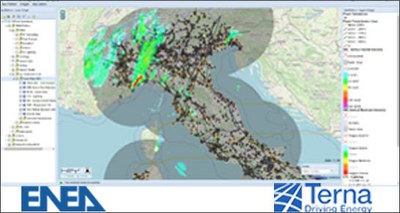Energy: ENEA and Terna join forces to improve safety and resilience of the electric grid
28/10/2021
 Improving resilience and safety of the national electric grid through innovative technologies and systems of artificial intelligence, sensors, IoT and high-resolution forecasting models. These are the objectives of two projects ENEA will develop on behalf of Terna to boost the effectiveness of post-emergency prevention and "recovery" actions, the assessment of the impact and risks of extreme weather and geological events and other electrical faults due to, for instance, salt accumulation on power lines.
Improving resilience and safety of the national electric grid through innovative technologies and systems of artificial intelligence, sensors, IoT and high-resolution forecasting models. These are the objectives of two projects ENEA will develop on behalf of Terna to boost the effectiveness of post-emergency prevention and "recovery" actions, the assessment of the impact and risks of extreme weather and geological events and other electrical faults due to, for instance, salt accumulation on power lines.
The two projects, part of a collaboration agreement signed by ENEA and Terna at the beginning of the year, envisage the creation of a warning alert system to direct and focus interventions in the areas most at risk, with targeted and programmable solutions that allow to reduce maintenance costs.
The solutions, developed with a capital light approach focusing on cost-effectiveness and efficiency, will synergistically support the network development to ensure successful management of critical situations.
"We are very satisfied with the collaboration with Terna, considering that ENEA has been involved for some time in research projects on the development of technological systems, risk assessment and monitoring for the protection of critical infrastructures from natural and anthropic events, acquiring know-how and skills in scenario analysis and stress tests on infrastructures and, in particular, in the development of decision support technologies for the management of emergency situations", pointed out Giorgio Graditi, Head of the ENEA Energy Technologies and Renewable Sources Department.
"ENEA is leader at the national level and internationally committed to the study of airborne pollutants impacts through experimental analyses, forecasting models and simulation of scenarios, including natural components like volatile organic compounds emitted by vegetation, desert sands and sea salt, harmful to power lines”, pointed out Roberto Morabito, Head of the ENEA Sustainability Department of Productive and Territorial Systems.
"The collaboration with Terna to predict the atmospheric transport of sea salt particles will lead us to develop a national alert system to prevent power outages". "This agreement between two Italian centers of excellence confirms the central role research and innovation play in increasing the safety and resilience of energy infrastructures”.
With the support of ENEA we are implementing additional useful actions to address the risks associated with extreme climate events, hinged both on the development of the network and the adoption of new low-cost technologies which make it possible to boost the reliability of our infrastructures', pointed out Francesco Del Pizzo, Head of the Terna Department of Grid Development Strategies and Dispatching. "New technologies, innovation and digitalization are, as outlined in the Industrial Plan 2021-2025 'Driving Energy', crucial to define new approaches to work, adapted to the change enforced by last year’s events and to enable the energy transition to benefit of the resilience, security and flexibility of the whole system ”, Del Pizzo said.
Terna, the company that operates the national power grid, is already installing advanced sensor, monitoring and diagnostic systems, including predictive ones, for the safety of the grid and the territory. Through the use of IoT technology and innovative digital tools placed on the infrastructure, Terna also collects useful data to safely manage the power system and prevent emergency situations.
Out of the 8.9 billion euro envisaged in the 2021-2025 'Driving Energy' Business Plan, approximately 900 million euro are allocated for innovation and digitalization.
For more information please contact:
Vittorio Rosato, ENEA - Head Laboratory for Analysis and Protection of Critical Infrastructures , vittorio.rosato@enea.it
Gabriele Zanini, ENEA - Head Division Models and Technologies for the Reduction of Anthropic Impacts and Natural Risks, gabriele.zanini@enea.it
